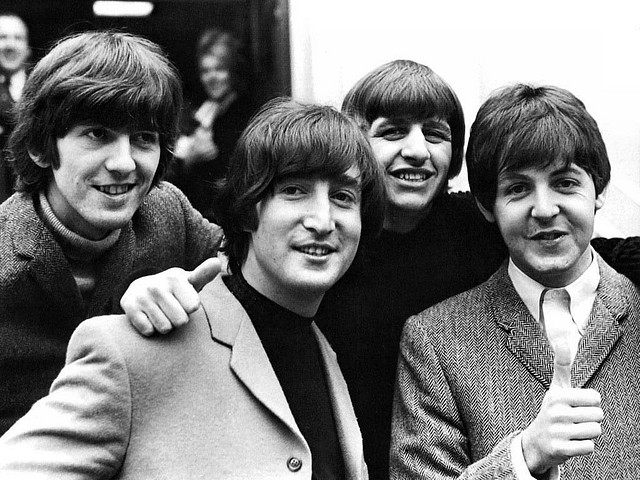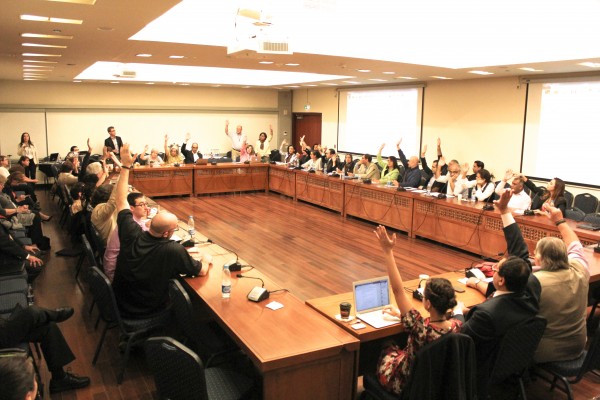‘Yesterday’ and Today: Why The Beatles Still Matter
BY AMINA ZAINELDINE
@A_ZAINELDINE

Music aficionados around the world just celebrated the 50th anniversary of Yesterday, one of the most recognizable songs in the history of modern music which reflects the lingering legacy of the Beatles.
A track on their 1965 album Help!, ‘Yesterday’ was in the mighty company of hit songs like ‘Help!’ and ‘Ticket To Ride’. Nevertheless the individuality of its style and melody gave it a quality that stood out even within the band’s repertoire.
The impact of ‘Yesterday’ on modern music is manifest. Scores of artists covered it, some of them legends in their own right, such as Ray Charles, Plácido Domingo, Bob Dylan, Elvis Presley, and Frank Sinatra.
The song’s impact reached Egypt, too. Waleed Shaaban, drummer of Egyptian Beatles tribute band Pepperland, says that the band’s vocalists don’t even need to sing. When ‘Yesterday’ plays, the crowd does the job, not missing a word of the lyrics.
But the Beatles’ influence is far more extensive than that. They remain symbols and contribute to the zeitgeist from their heyday until today, half a century later, in a country very far away from Liverpool.
“I play the guitar because of The Beatles,” says AUC sophomore Youssef Nazmy, who is double- majoring in Computer Science and Music Technology. “I listen to all of their music,” he added.
When The Caravan asked AUC professor, Theatre Program Director and long-time Beatles fanatic Mahmoud El Lozy why he thought the Beatles had this effect, he said that it was owing to the inventiveness of their melodies and harmonies and to their catchy songs.
“I can’t think of any bad Beatles song,” said El Lozy. “You were getting value for your money when you got an album. You knew you’d listen to it forever,” he added.
To El Lozy and others who were around at the time, the Beatles were more than a music group; they were a lifestyle. Their hairstyles were imitated, Lennon’s round glasses became fashionable, and weekends around a record player to listen to their albums became tradition.
“I remember when they broke up,” El Lozy told The Caravan.
“It was the first news item on the BBC. I started crying. ‘No more Beatles, our life is going to be over!’ We were young when it happened, we thought things were going to last forever. It was one of the first experiences of a sense of loss, but like George Harrison says, ‘all things must pass.’”
However the constant emergence of Beatles tribute groups, as well as bands and musicians inspired by them, is the clearest sign of the Fab Four’s lasting legacy.
Some of those bands will be tribute bands like Pepperland, but some will be phenomena like progressive rock legends Pink Floyd, glamorous Queen led by the unforgettable Freddie Mercury, Britpop sensations Oasis, and post-grunge band, The Foo Fighters.
Formed in Liverpool in 1960, the Beatles got their first big break performing in Hamburg, Germany. From then on, John Lennon, Paul McCartney, George Harrison, and Ringo Starr were extraordinarily prolific until their breakup in 1970.
Hany Mustafa of the Egyptian tribute band Glass Onion told The Caravan the reason he believed that The Beatles’ songs stood the test of time.
“The Beatles had the ingredients for the perfect formula,” Mustafa said. “Four charismatic guys with distinctive voices, a dashing sense of humour, and chemistry between them as well as competition.”
Glass Onion’s audience ranges from young teenagers to people who were around before The Beatles split. “Their music knows no age group,” says Mustafa. “It appeals to everyone.”




